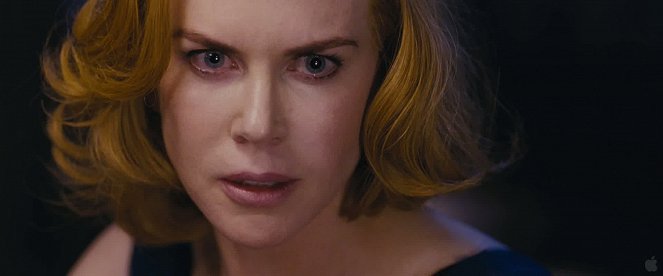Regie:
Chan-wook ParkDrehbuch:
Wentworth MillerKamera:
Chung-hoon ChungMusik:
Clint MansellBesetzung:
Mia Wasikowska, Matthew Goode, Nicole Kidman, Jacki Weaver, Dermot Mulroney, Alden Ehrenreich, Lucas Till, Ralph Brown, Judith Godrèche (mehr)Inhalte(1)
Nachdem India ihren Vater bei einem Autounfall verloren hat, steht plötzlich ihr Onkel Charlie vor der Tür. India und ihre psychisch labile Mutter Evelyn hören zum ersten Mal von Charlie, doch der überzeugt die beiden, mit ihnen zusammenzuleben. Doch hinter dem vermeintlich netten Onkel verbirgt sich ein Geheimnis. (ProSieben)
Kritiken (8)
Eine visuell bezaubernde und schauspielerisch behexend dargestellte Variante vom Stoff über einen psychopathischen Eindringling in der Familie, wie ihn im Jahr 1943 Hitchcock definierte und dann alle Detektiv-TV-Serien genutzt haben. Diesmal wurde er aber ohne Emotionen, Spannung und ohne eine glaubwürdige Psychologie der Figuren dargestellt, weshalb der Film nicht funktioniert und absolut überflüssig ist.
()
What teenage American girls really dream about… Park attacks American cinema with its own weapons. In the frame for a family melodrama, whose ideology (family above all, children as a chance to make things right) is cruelly mocked, he has set a formalistically polished, thoroughly deviant film that defies categorisation in any particular genre. Beginning with the flashforward that opens the film (and indicates the dominant narrative perspective that goes beneath the surface), we are confused and led in wrong directions by various narrative devices. We learn important information sooner or later than the characters, genre conventions are used in unexpected contexts, and an equal sign could be drawn between the villains and the protagonists. With the frequent use of continuity of the shots, seemingly random details (the sole of a foot, a spider) gradually fit into the well-thought-out structure and become important motifs serving both the obvious thematic levels of the story and those that lie beneath the surface. At the same time, the occasionally disgusting details (the bursting of a blister) indicate how India perceives reality, which is probably most clearly demonstrated by her art-class painting of the inside of a vase (instead of painting the vase itself or the flowers placed in the vase). ___ Park is well aware of how certain types of scenes are constructed in Hollywood, which is why he ironically places those formulas in the foreground (the rhythmisation of a scene using a metronome, which is present in the diegetic space of the film) or circumvents them (disregard for the axis rule in the three-part dialogue scenes, the discontinuous sequencing of shots throughout the film). Through an ironic lens, we can also see the main protagonist, who has similarly morbid interests as many of her peers, but in her case it’s not mere posturing. ___ In the mould of Shadow of a Doubt, the whole film is structured as a suspenseful – albeit very ambiguous in terms of moral categories – duel between a pair of adversaries who complement and destroy each other and whose forces are only seemingly unequal. The narrative is largely organised by means of parallelism, which is behind some of the film’s most impressive scenes (e.g. the orgasmic piano duet), motivates the changes in perspective within a single long shot (either by changing the direction of movement or through more conventional refocusing) and makes us aware of moments that are important to the plot (most of the essential revelations occur on the stairs, which are “ruled” by Charlie at the beginning and by India at the end). The peak moments of the film are the two precisely built-up and rather shocking cut scenes, of which the first places sex and death on the same level and the second uniquely compresses three time planes into one. ___ From a psychoanalytical perspective, Stoker is an extremely dense film, though it occasionally resorts to naïve literalism and works with some symbols far more conspicuously than, for example, Hitchcock, who had to be more restrained in this respect due to censorship (he could perhaps have only gotten away with Charlie’s assessment of the wine accompanied by meaningful glances at India). In the shots shared with India and Charlie, the mother is a superfluous and disruptive element, which partially corresponds to the meaning of the role played by Nicole Kidman, who – despite her stardom – is more or less an extra in the film (which is to say that her performance is a violation of expectations associated with the star system) and becomes interesting only during a symptomatic reading (a reprise of the “primal scene”, which awakens India’s sexuality). ___ In the context of American production, Stoker is a refreshingly cynical film whose cohesiveness at the level of both the lower and higher narrative units is a joy to analyse again and again (because you certainly won’t exhaust all of its possibilities in one or two viewings), though you will occasionally have to turn a blind eye to the naïveté of its screenplay. 90%
()
(weniger)
(mehr)
Awesome! Such a perfectly polished film is something we see only once or twice a year. It was pure joy from the first to the last minute, everything is where it should be. I won’t even criticise the script much. The movie relies on human irrationality and instinct, so the “illogical” behaviour of the characters can be easily excused. Brilliant in every way.
()
Stoker is living proof that you can bake a good cake even from story that is a crock of runny shit; and luckily it’s not just about individual memorable scenes (even though the shower, piano four hands and pencil sharpening will stick in your head for sure), but about the overall disturbing atmosphere, Parker’s directing superiority and the Mia/Goode duo. But Wentworth Miller should stick to prison escapes.
()
Was den visuellen Aspekt betrifft, habe ich keine Einwände, es ist eine Augenweide. Mein Problem liegt bei Wasikowská, die als psychisch unausgeglichenes, aber geile Mädchen jedem um sie herum feindselige Blicke zuwirft und fast schon galant ihre Mutter in der Gestalt von Kidman fickt. Und da sie immer noch verführerisch aussieht, fast schon für ihre 50 Jahre, ist es umso bedauerlicher, dass sie zumindest eine sexy Nummer nicht hinbekommt. Die Geilheit aller drei Figuren war nämlich mehr als spürbar in der Luft.
()
How can I say this politely, Pak? You're pissing me off. For years, I believed that nobody could shake me in terms of cinema, and I could handle even Simandl and his creations without problems at one point, but I simply can't handle you anymore without my tube of medication for high blood pressure. There's so much talent wasted that it just hurts. You are a kitsch artist. Maybe the king of kitsch artists, but that won't defend you in my eyes. The aestheticization of violence already bothered me in Old Boy, and here it's just a continuation of the same. Emotionally, we are completely different. Overall impression: 10% for the acting ensemble. You won't deceive me with the rest. Farewell and make sure to avoid the places where I hang out. The wasted time really hurts.
()
Park Chan-wook ist ein Synonym für auffälligen, aber hohlen Manierismus. Wenn ich mir die herausgeschnittenen Szenen ansehe, wird mir klar, dass das Ganze sehr viel Mühe gekostet haben muss, um es auf eine andere Art und Weise verdaulich zu machen als nur durch ausufernde Ideen im Stile von in Bewegung versetzten Manga-Tafeln. Aber wenn Sie von Emo Wasikowska fasziniert sind oder Nicole Kidman als in der Spalte sie und Moderegisseure abhaken wollen (und Sie brauchen dazu mehr als sie und Lars von Trier), dann nur zu. Wenn Sie nach Inspirationen für die abendliche Selbstbefriedigung suchen, ist dies überraschenderweise auch der richtige Weg, aber nur, wenn Sie Ledergürtel mögen.
()
CONTAINS SPOILERS, BY NO MEANS READ BEFORE WATCHING. The best and yet most bizarre thing about this work is the brutal contrast. On the one hand, such poetic, imaginative, subtle, and wonderfully sensitive direction; on the other, a pretty brutal portrait of a homicidal maniac who takes his responsibility to family tradition very seriously and of course has the best interest of preserving the "family lineage" (or more aptly, all that's left of it). I hadn't researched anything about this film beforehand, all I knew was that it was directed by Park Chan-wook and starred Mia Wasikowska and my lifelong platonic love Nicole Kidman. It's certainly worth mentioning the particularly oppressive atmosphere, which has a slight erotic tinge in places, but because Park Chan-wook is very watchable this time around, you can tell from various little details and clues that the eroticism is really an afterthought here. In the end, this is an extraordinarily perverse film that depicts the darkest aspects of human existence in a captivating and visually extremely inventive way, degrading man himself to some mere instinctive essence. You know, I've often wondered why it is that people have children in the first place... And the conclusion I've come to... is that at some point in our lives we realize that things are fucked up beyond repair... So we decide to start again. Wipe the slate clean. Start fresh... And we have children... Little carbon copies we can turn to and say, "You will do what I could not... You will succeed where I have failed...," Because we want someone to get it right this time.
()

